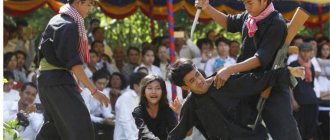Sample appeal against a court verdict
To the Judicial Collegium for Criminal Cases of the Samara Regional Court
ADDRESS1
From lawyer Dragunov Maxim Evgenievich,
having reg. No. 63/3215 in the register of lawyers of the Samara region,
operating at AB “Antonov and Partners”
at the address: 443080, Samara, Karl Marx Ave., 192, office. 619,
tel. +7-927-734-08-16,
e-mail adress
In defense of the interests of the victim FULL NAME4.
APPEAL
on the verdict of the Industrial District Court of Samara dated DATE
By the verdict of the Industrial District Court of Samara dated DATE, FULL NAME1, he was found guilty of committing crimes under Part 4 of Art. 159, part 4 art. 159 of the Criminal Code of the Russian Federation and in accordance with Part 3 of Art. 69 of the Criminal Code of the Russian Federation, he was sentenced to imprisonment for a period of 4 years.
In accordance with the provisions of Art. 73 of the Criminal Code of the Russian Federation, the punishment assigned to FULL NAME1 was considered suspended, with a probationary period of 3 years 6 months.
According to the requirements of Part 2 of Art. 389.18 of the Code of Criminal Procedure of the Russian Federation, an unjust sentence is a sentence for which a punishment was imposed that does not correspond to the gravity of the crime committed, the identity of the convicted person, or a punishment that, although does not go beyond the limits provided for by the relevant article of the Criminal Code of the Russian Federation, is unfair in its type or size, as due to excessive softness, and due to excessive severity.
In this connection, we consider the verdict of the Industrial District Court of Samara dated DATE, issued in relation to FULL NAME1, not justified, and the imposed punishment for FULL NAME1 is unfair, not corresponding to the gravity of the crimes he committed, as well as the personality of the convicted person due to the excessive leniency of the punishment imposed on the latter.
Thus, the sanction of Part 4 of Art. 159 of the Criminal Code of the Russian Federation provides for punishment in the form of imprisonment for up to 10 years with a fine of 1,000,000 rubles.
Thus, and guided by the provisions of Part 4 of Art. 15 of the Criminal Code of the Russian Federation, crimes committed FULL NAME1, namely two episodes, qualified under Part 4 of Art. 159 of the Criminal Code of the Russian Federation, belong to the category of serious crimes.
According to the contents of the said Verdict dated DATE, as mitigating circumstances, FULL NAME1, the court takes into account: committing a crime for the first time, satisfactory characteristics at the place of residence, the presence of a minor child, diabetes, providing assistance to close relatives - in accordance with the provisions of Part 2 of Art. 61 of the Criminal Code of the Russian Federation.
However, the diseases that FULL NAME1 has, in accordance with the Decree of the Government of the Russian Federation of January 14, 2011 No. 3 “On the medical examination of suspects or accused of committing crimes”, do not belong to the category of diseases that prevent him from being kept in correctional institutions, isolation wards, etc. d. (including in custody).
At the same time, the court of first instance takes into account the presence of young children as mitigating circumstances twice, in the first case, taking into account the presence of the child’s FULL NAME1 DATE1 of birth in accordance with Part 2 of Art. 61 of the Criminal Code of the Russian Federation, and in the second, regarding the presence of FULL NAME1 child DATE2. birth under clause “g”, part 1, art. 61 of the Criminal Code of the Russian Federation, i.e. each young child as the presence of an independent circumstance to mitigate the punishment, while the presence of any number of young children in FULL NAME1 must be taken into account as a mitigating circumstance under one paragraph of the Criminal Code of the Russian Federation, once.
At the same time, the circumstances contained in Art. 62 of the Criminal Code of the Russian Federation were not established by the court, just as they do not exist in the actual circumstances of the criminal case. Thus, the maximum possible punishment, without taking into account mitigating circumstances, for each episode of the crime committed, FULL NAME1, is equal to 10 years in prison. Therefore, taking into account the mitigating circumstances established by the court, the guilt of the convicted person, FULL NAME1, as well as the punishment, should be less than 10 years in prison.
Based on the imposed punishment, the court, in the episode with FULL NAME3, imposed a sentence of imprisonment for a period of 1 year 6 months, i.e. reduced the punishment FULL NAME1 by more than 7 times, and for the episode with FULL NAME4 imposed a sentence of imprisonment for a period of 3 years 6 months, i.e. reduced the punishment by more than 3 times. Despite such a significant reduction in the sentence, the court did not provide sufficient grounds for the fairness of such a significant mitigation of the sentence, and also did not give them a motivation.
At the same time, in accordance with the requirements of Part 3 of Art. 69 of the Criminal Code of the Russian Federation, if at least one of the crimes committed in aggregate is serious, then the final punishment is imposed by partial or complete addition of punishments. In this case, the final punishment in the form of imprisonment cannot exceed more than half the maximum term of punishment in the form of imprisonment provided for the most serious of the crimes committed.
Thus, the maximum possible punishment, without taking into account mitigating circumstances, FULL NAME1, is a term of imprisonment equal to 15 years, and accordingly, by the court, the final punishment for FULL NAME1 was reduced by more than 4 times.
At the same time, in accordance with the provisions of paragraph 27 of the Resolution of the Plenum of the Supreme Court of the Russian Federation dated November 29, 2016 No. 55 “On the Judicial Sentence,” courts are obliged to strictly comply with the requirements of Art. 307 of the Code of Criminal Procedure of the Russian Federation on the need to motivate conclusions in a guilty verdict on issues related to the imposition of criminal punishment, its type and amount.
However, in the Judgment of the Industrial District Court of Samara dated DATE, the court did not examine or motivate the question of why the court reduced the punishment FULL NAME1 for a rather significant period.
Further, as follows from paragraph 27 of the said Resolution of the Plenum of the Supreme Court of the Russian Federation dated November 29, 2016 No. 55, in the descriptive and motivational part of the sentence, the court must indicate the reasons why the court came to the conclusion that it was necessary to assign a suspended sentence to the defendant. These circumstances in the Verdict dated DATE in relation to FULL NAME1 were not established or described by the court. Thus, the court, without explaining its motives, reduced the punishment for FULL NAME1 by more than 4 times, i.e. more than half the maximum possible punishment, as well as in the absence of circumstances provided for by the provisions of Art. 62, 65, 66, etc., since such circumstances were not established in the actual circumstances of the criminal case. Circumstances for applying to the defendant the provisions established by Art. 64 of the Criminal Code of the Russian Federation, the court of first instance also did not find it.
Thus, it is not clear how the court so softens the punishment FULL NAME1, but moreover, recognizes that this punishment is suspended without motivating its conclusions and thereby violating the provisions established by Art. 297 of the Code of Criminal Procedure of the Russian Federation, and without complying with the requirements of legality, validity and fairness.
In addition, according to the Judgment in question dated DATE, the court comes to the conclusion that it is necessary to add partial, rather than complete, penalties FULL NAME1, as provided for in Part 3 of Art. 69 of the Criminal Code of the Russian Federation, while moving away from the justification for why the imposed punishment for serious crimes committed FULL NAME1 must be added by partial rather than complete addition, thereby violating the requirements established by the Resolution of the Plenum of the Supreme Court of the Russian Federation dated December 22, 2015 3 58 “On the practice of appointment by courts RF criminal punishment.”
At the same time, as follows from the contents of the Verdict of the Industrial District Court of Samara dated DATE, as well as from the materials of the criminal case, FULL NAME1 did not admit guilt in full for the crimes charged to him, the damage caused by his criminal actions in the amount of 6,600,000 rubles . did not compensate in full, and does not want to compensate, which the court of first instance did not take into account as a circumstance affecting the amount of the imposed punishment. In fact, FULL NAME1, believes that he did not commit any criminal acts against the victims, which indicates his danger to society and the possibility of re-committing a similar crime against other persons.
Thus, we believe that under these circumstances, the punishment assigned to FULL NAME1 cannot in any way correspond to the degree of severity and his post-criminal behavior, as well as the fact that the likelihood of his correction may be due to the recognition of the punishment as suspended, i.e. be recognized as fair and justified.
At the same time, the court’s conclusions that Full Name 1 compensated for damage to Full Name 3 contradict the actual circumstances of the criminal case.
So, as follows from the testimony of Full Name 3 himself, given by him both during the preliminary investigation and in court, it follows that the funds that are the subject of the crime, which the latter handed over to Full Name 1, were returned to him by the father, Full Name 1, Full Name 2, at the time of their chance meeting in the parking lot, in connection with which he had no claims for money. In turn, it follows that FULL NAME1 himself did not transfer any money to anyone, but his deceased father did this for him, who was worried about the fate of his son, which was obvious during the investigation, since FULL NAME2 constantly refused to give any testimony in relation to his son, - FULL NAME1 Thus, it is likely that if FULL NAME2 had not met and transferred for his son the funds stolen by the latter from FULL NAME3, FULL NAME1 would not have handed them over either, which indirectly may indicate an increased degree of his social danger and the impossibility of correction by other means of punishment, except for the imposition of a more realistic and more severe punishment than was assigned to him by the Industrial District Court of Samara.
Funds awarded to FULL NAME4 in civil proceedings in the amount of RUB 3,300,000. FULL NAME1 has not returned until now and does not intend to return, which clearly follows from his position and complete non-admission of his guilt in the crimes he has committed, which also confirms the above in relation to FULL NAME3, and also indicates the presence of a public danger and the possibility of committing similar crimes in the future . However, these questions were ignored by the court of first instance and were in no way reflected in the conclusions of the Verdict dated DATE, just as the facts that FULL NAME1 did not make any attempts to apologize to the victims, to at least partially make amends for the harm caused by his crimes, were ignored , on the contrary, he put forward versions with the help of which he hoped to evade criminal and civil liability.
According to the stated and established factual materials of the case, after the commission of the crimes, FULL NAME1 did not contact the victims, did not answer phone calls, avoided meetings and hid from them.
As you can see, the Verdict dated DATE absolutely does not disclose the identity of FULL NAME1, his attitude to the crimes he committed, etc.
At the same time, we believe that the punishment imposed by FULL NAME1 completely contradicts the established principles of criminal procedure legislation and cannot meet the requirements of Part 2 of Art. 6 of the Code of Criminal Procedure of the Russian Federation, according to which criminal prosecution and the imposition of a fair punishment on the perpetrators equally correspond to the purpose of criminal proceedings, and are also perceived as socially fair, i.e. satisfy public outrage caused by the crime.
The convicted person did not admit guilt, did not compensate for the damage, and did not repent.
Thus, we believe that the punishment assigned to FULL NAME1 by the verdict of the Industrial District Court of Samara dated DATE cannot be considered legal, justified and fair, corresponding to the gravity of the crimes he committed, as well as the personality of the convicted person due to the excessive lenity of the punishment imposed on him.
Guided by the provisions of paragraph 36 of the Resolution of the Plenum of the Supreme Court of the Russian Federation dated June 29, 2010 No. 17 “On the practice of application by courts of norms regulating the participation of the victim in criminal proceedings” when the victim’s appeal is received by the appellate court, checking the legality and validity of the verdict in the criminal case or another court decision, it is necessary to evaluate all the arguments contained in the complaint, regardless of the grounds for changing or canceling the court decision.
Based on the above and guided by the provisions of Art. 189.1, clause 9, part 1, art. 389.20 Code of Criminal Procedure of the Russian Federation, paragraph 36 of the Resolution of the Plenum of the Armed Forces of the Russian Federation dated June 29, 2010 No. 17,
ASK:
To change the Sentence of the Industrial District Court of Samara dated DATE and sentence the convicted person FULL NAME1 to real imprisonment.
Applications:
—
Original order
— Copy of the Judgment of the Industrial District Court of Samara dated DATE.
Representative of the victim: _____________________ / M.E. Dragunov
Appeal procedure
If a citizen believes that a court decision is unfair and violates his rights, he must appeal it in the manner prescribed by law. Depending on the situation, you will have to submit:
- Appeal. The document is transferred to the court of first instance, whose decision the plaintiff wants to appeal. This can be done within 10 days from the date of the decision. If this deadline is missed, you will have to file a petition to extend the appeal period. But it will be granted only if the plaintiff proves that he did not file an appeal in a timely manner due to compelling and serious reasons. During the meeting, additional materials and evidence of the guilt/innocence of the offender may be taken into consideration. As a result of the trial, a decision may be made to overturn the unfair verdict.
- Appeal. If a participant in the process believes that the punishment is unfair, he must file a cassation. In this case, the validity of the decision will be checked by a higher court. Not only a civilian, but also a prosecutor has the right to file a cassation appeal. In particular, through a cassation appeal, he can achieve an increase in the period of detention or the application of a more serious penalty.
- Supervisory complaint. To determine whether a previous sentence was fair and reasonable, you can appeal to the Supreme Court. This will have to be done if the appeal and cassation are not satisfied and the decision comes into force.
Question answer
Question: Is it possible for the victim to have his sentence commuted at the request of the victim? We are talking about the theft of a wallet containing a large amount of funds. The police were able to quickly detain the criminal, and he returned all the money. Where should I go for this, and how to act in such a situation?
Answer: The opinion of the victim will be taken into account by the court when considering the case. Therefore, it is important to appear at the court hearing to state your position and justify your demands. But if the case is still under consideration, you can contact the investigator with a written request to terminate the criminal proceedings. Perhaps, taking into account other circumstances, the case will be closed due to the absence of a crime (if the money was returned in full).
Question: An ex-wife, who has not been involved in the child’s life for a long time, committed an unlawful act and was sentenced to 5 years. But the appellate court reduced the period of detention in a correctional institution, based on the fact that she allegedly had a young child in her care. Is it possible to challenge such a decision?
Answer: Only the prosecutor has the right to appeal against increased punishment. Any other person cannot file such a claim in court. At the same time, if the convicted woman has not been deprived of parental rights, the use of this article to mitigate the punishment is completely legal and legitimate.
Question: Can the appellate court impose a different sentence based on the same materials and evidence?
Answer: The appellate authority has the right to re-examine the evidence and materials provided in order to change the type of punishment. Based on the results of the consideration of the case, she may make a different decision, which is not a violation of the law.
Question: How realistic is it to achieve a reduction in the period of detention due to theft of someone else’s property if the crime was committed by a group of people and the accused already has a suspended sentence?
Answer: In such circumstances, the only way to avoid severe punishment is to return the embezzled property and write a confession.
The legislative framework
To achieve a review of a previously made decision, one should rely on the following legislative acts:
- Criminal Procedure Code of the Russian Federation dated December 18, 2001. N 174-FZ (as amended on July 31, 2020).
- Criminal Code of the Russian Federation dated June 13, 1996. N 63-FZ (as amended on July 31, 2020).
- Code of the Russian Federation on Administrative Offenses dated December 30, 2001. N 195-FZ (as amended on July 31, 2020) (as amended on August 11, 2020).
- Constitution of the Russian Federation (adopted by popular vote on December 12, 1993, with amendments approved during the all-Russian vote on July 1, 2020).
- Review of judicial practice of the Supreme Court of the Russian Federation No. 2 (2020) (approved by the Presidium of the Supreme Court of the Russian Federation on July 22, 2020).









